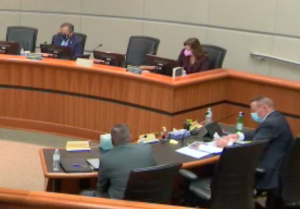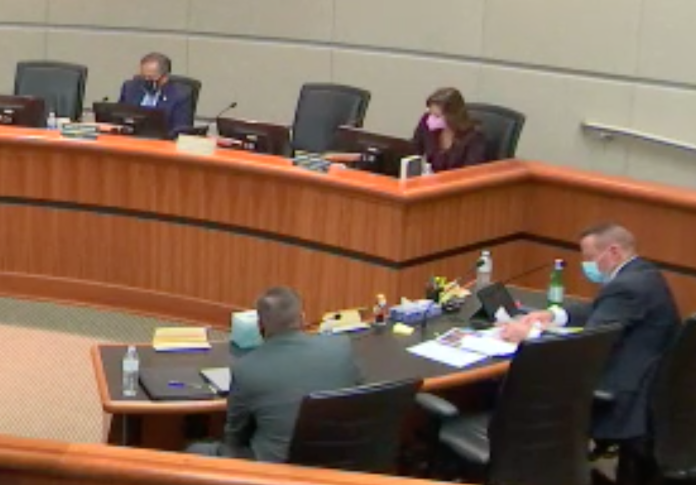After several months of discussing strategy to combat an accusation of violating state law in closed sessions, the city of Cypress finally went public with the first of a series of forums that shed little light on the topic.
Mayor Paulo Morales and Arianna Barrios, a city council member in the City of Orange and who is a paid contractor by the City of Cypress for this project, answered questions posed by Cypress citizens attending a Zoom meeting to discuss the city’s strategy in defending allegations of violating the California Voting Rights Act.
Although the council members were introduced during the opening to the meeting, they were not allowed to answer questions or interject anything into the debate.
In a slide presentation, Barrios gave those attending the meeting a history of the Civil Rights movement and a primer on voting law development since the 1960’s.
In addition, she also traced the progress of the California Voting Rights Act, saying it “expands upon the Federal Voting Rights Act” in that it provides even more protection for California residents than does the federal legislation.
“The most significant thing [is] that the CVRA makes it easier for minority groups to prove their votes are being diluted like at large elections,” said Barrios.
“Since its passage in 2002, CVRA has promoted two decades of change in the California election process. In all, 216 school districts, 34 community college districts, 137 cities and 35 water and other special districts in all county boards of supervisors statewide are now elected representatives by district,” she said.
A Malibu law firm has charged the city with diluting its major Asian population by electing council members with at-large elections, rather than single member districts.
Attorney Kevin Shenkman has said that if Cypress does not have districts drawn by June, a lawsuit will be filed against the city. The law firm is representing the interest of the Southwest Voter Education Project seeking a change in the city from at-large elections to single member districts.
Nevertheless, in the first of three public forums, Cypress claims there is no basis for a CRVA violation and further, a demographic study, which has not been released, indicates that it would be difficult to carve out a district of Asian predominant influence.
“To date, the city has not found any merit that it is in violation of the law,” said a narrator during a prerecorded presentation.
And while some residents asked pointed questions, others did express their opposition to single member districts.
Barrios and Morales read the written responses and selected the questions to answer during the 90-minute forum.
Melissa Murray worried that single member districts could lead to a “loss of unity,” suggesting that council members would be more concerned with their own districts than “what’s best for the entire city.”
“Cypress is a small community and by dividing into districts will create division,” commented David Halamy.
Another resident, Edwin Kraemer, said “there is a growing concern by the citizens that the council is out of touch with the direction of the community.” He suggested several recent projects would have taken different paths had “connected leadership,” aka district-based voting been in place.
Kraemer suggested “there is too much power and influence centered around an arbitrary kernel of the city.” He said district-based elections would “intentionally distribute” this
“influence and representation throughout the city.”
Several residents expressed concern that the city has been meeting in private since receiving the demand letter rather than being more open with residents.
Morales said what the city is doing is “responding to this allegation that the city has violated the CRVA and we’re a long way, quite honestly, from that. It’s not an issue of meeting in private or meeting in secret,” Morales said, “when you’re faced with something this important, you don’t come right out and all of a sudden say this is what we’re going to do.”
Morales told viewers that the executive sessions since September have been to “understand what the challenges are before us, what we need to do…and if there is any substance to this alleged violation.”
Despite the protestations to the contrary, Sonni Waknin, the managing attorney for the UCLA Voting Rights Project maintains there is a way for Cypress to create single member districts that would be fair for the city and for the city’s majority Asian population (now 37 percent).
Two citizens who participaterd in the forum said latert that it appears as though the city is doing everything possible to delay the districting process until after the 2022 elections.
David Burke, the founder of Citizens Take Action, a nonprofit civic engagement organization located in Cypress, said while it is laudable that the city was attempting to get feedback from citizens, “why didn’t they do it last year when they got the letter [from Malibu attorney Kevin Shenkman].”
“It seems inevitable that Cypress will have to move to single member districts at some point,” he said, but for now, said Burke, “it seems the council is primarily trying to delay rather than do it, maybe before the next election. At least that was my impression.”
If and when districting happens, Burke has offered the city the assistance of his nonprofit to create fair districting boundaries.
Dr. Malini Nagpal, who was active in this week’s forum and was one of the applicants for the open council seat, said what the Council is trying to do “is present so many options that the public is confused, and then they can say that our citizens want us to fight it and if they go to court, that might be okay [for the Council] because then it would not be resolved until after the next election.”

Courtesy photo

